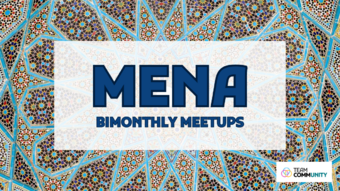March 20 2024, MENA Meetup
The MENA Regional Meetups are bimonthly video calling gatherings that bring together folks from the MENA region to share, connect, seek help, and release stress by celebrating each other. In addition, it's a time for us to find ways to support each other, and help us understand what is happening in our part of the world. If you cannot attend the monthly meetups, we are taking notes of each gathering and linking to them below.
The MENA community is connected during the week in different ways. Either through various MENA-focused channels on the TCU Mattermost or via different events organized on various topics during the year.
| MENA Meetups |
Date: March 20 2024
Time: 4pm EET / 10am EDT / 2pm UTC (What time is it in my city?)
Who: Facilitated by Yosr
Where: The link will be shared in the Regional MENA's channel on the TCU Mattermost one or two hours before the start of the meeting.
- Don't have an account to the TCU Mattermost? you can request one following the directions here.
👉🏾 Collective notes: https://pad.riseup.net/p/tcu-mena-bimonthly-meetups-keep
Notes
Digital rights in Sudan:
- Brief overview about the situation since April 2023
- Internet access/shutdown overview
- e.g. February 2024 RSF-imposed nation-wide shutdown
- In the past, laws like TPRA governed or justified actions related to internet access. But this time, RSF didn't use a law to justify their actions and just shut it down.
- Milestone: Sudanese authorities allowed Starlink internet access (for free and not under their control). RSF also allowed Starlink in their areas commercially (expensive in relation to cost of living--1 hour for 2.5 USD).
- How are digital rights affecting (in tangible ways) peoples' daily lives?
- People missed flights, because they could not receive the tickets and information in time. (e.g. their family abroad booked a ticket for them and sent the information via email and it was not received in time)
- People have lost jobs because they cannot connect.
- People could not access banking apps, and therefore struggled financially.
- Someone who got married and was unable to celebrate with their family due to distance/lack of internet connection.
- Can you share more about the digital rights community in Sudan. Is there a community? How do you stay in touch?
- There is not really a community at the moment. There are maybe two other people known in the space, and that's it.
- Digital Rights Lab (https://twitter.com/DRLab_Sudan) established in 2022. Partnership with OONI, Digital Action, Freedom House, etc.
- Most communication with journalists who are interested in the topics of human rights, and they contextualize the topic to human rights and digital freedom.
- About misinfo/disinfo, narrative control, and social media platforms
- TV and radio is difficult to verify, and is used to spread misinfo by govt--people are struggling to navigate all the misinfo. Getting wrong information may impact their decisions to move around and where is safe (e.g. RSF soldiers in a place they heard was safe).
- HRW called RSF soldiers "men without mercy" so this is extremely dangerous.
- Social media platforms played a huge role in the pro-democracy movement. Main pools of manipulation too.
- Milestone: Meta took down the official unrelated accounts of RSF, justifying the step by calling RSF a dangerous organization. Despite this "good step with a good intent" it actually indirectly contributed to SAF controlling the information and narrative of the war (and contributed to negative polarisation and against peacebuilding). Now there is no way of communication by RSF on Facebook (they are only on Twitter).
- Facebook is the most used platform by Sudanese people.
- Mistake for social media companies to take steps without considering the local context.
- Journalists trainings and What more can we do to help?
- There is a problem with capacity-building organizations in Sudan. Civil society was suppressed and working underground. Capacity-building was mostly done in Nairobi and by other foreign experts. Number of Sudanese who can provide capacity-building training such as with digital security and documentation is very low.
- Conducted a training in January about journalistic work facing online shut downs. Will provide digital security training for Sudanese activisits in Sudan.
- What has happened to the civil society groups in the past year, especially in the diaspora or with communication challenged within Sudan?
- Feminism community--strong network in Kampala called SIHA (not just Sudan but horn of Africa) https://sihanet.org/
- Journalist syndicate in diaspora
- Best news website: Sudan Tribune -- a more neutral general news website. But about digital rights and internet freedom are coming very slowly.
